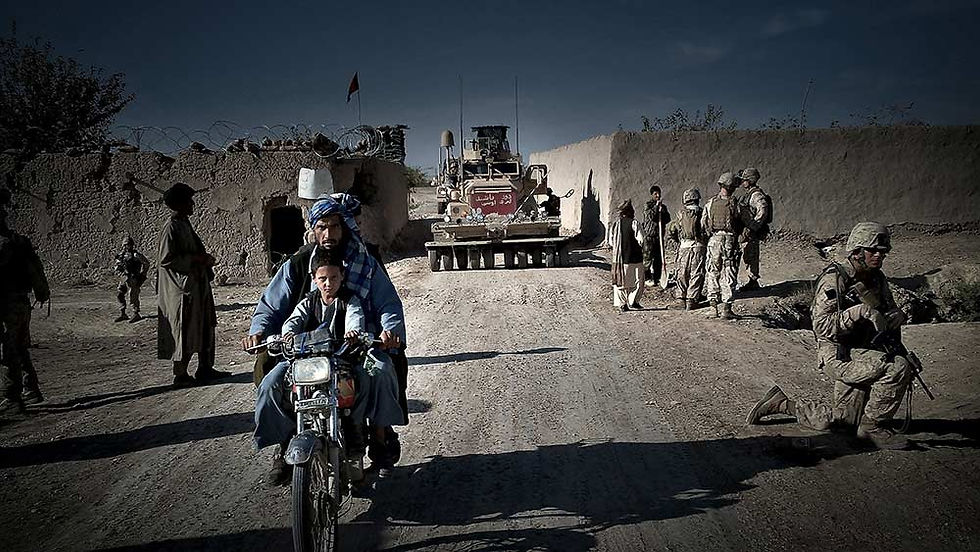Photographers in Afghanistan, Basetrack media project - Teru Kuwayama, Balazs Gardi, Tivadar Domaniczky
- Oct 3, 2014
- 3 min read
Updated: Mar 14, 2025
BASETRACK was a media experiment funded by a 2010 News Challenge grant from the Knight Foundation. Photojournalists Teru Kuwayama, Balazs Gardi and Tivadar Domaniczky were embedded with 1st Battalion, 8th Marines, in southern Afghanistan, 2010-11. Led by Teru Kuwayama, they started a revolutionary online project called Basetrack. Connecting battalion members with their families and others around the globe, the web platform became an indispensable tool of citizen journalism, documenting a range of perspectives on the emotional tolls of war.
A collection of their photographs was edited into the composed work (above) by Nina Colosi for the performance/exhibition "We Write This To You From The Distant Future" at Juilliard’s Center for Innovation in the Arts on March 26-27, 2011.
In 2012 the Juilliard's Center created a theatrical production of BASETRACK and from this a US touring production was developed. BASETRACK opened at Brooklyn Academy of Music on November 11, 2014. produced by En Garde Productions and toured 40 US cities with extensive engagement programming.
BASETRACK

2010 Knight Fellow Teru Kuwayama in Afghanistan, October 2010. photo: Tivadar Domaniczky
BASETRACK Photographers Embedded with Marines in Afghanistan for an experimental media project funded by the Knight Foundation
Basetrack: One-Eight is an experimental media project, funded by a 2010 Knight News Challenge Grant awarded to photojournalist Teru Kuwayama. He organized a team of independent photographers and journalists to use an online journal – basetrack.org, to chronicle the events of the 1st Battalion, 8th Marines in Afghanistan, by connecting the personnel, their families and other stakeholders and share information through their online social network.

Photo by Tivadar Domaniczky – engineers at work . A small team of mobile media operators, organized by Kuwayama, embedded with the battalion, transmitted their reports and reflections from Helmand province as they traveled across the battalion’s area of operations from 2010 to 2011. They broadcast to the United States and beyond “using social media, with the hope that it can bring the war back to the American public in the way that television did during the Vietnam years…. I am personally of the opinion that the American public should be much more aware of what its military is doing and be more engaged with the military and should be listening to the military.” …Teru Kuwayama

Basetrack’s team was supported by a network of technologists, analysts, artists, and journalists, working around the clock, from around the world, to connect over a thousand Marines and Corpsmen to their families, and to connect a broader public to the longest war in US history.
Basetrack @Sadika quoted Brigadier Ed Davis, “If we are going to succeed in Afghanistan, we need to focus on the cause of the insurgency – which is the intimidated, vulnerable, disenfranchised people – and not the symptom, which is the insurgent fighter.”

Photo by Tivadar Domaniczky
"SUSTAINABILITY"
Teru Kuwayama: the real deal on “Sustainability” in Afghanistan
Centerpoint Now, the biennial publication of World Council of Peoples of the United Nations, invited photojournalist and founder of Basetrack, Teru Kuwayama, to describe his vision of “sustainability” in the context of his experience documenting both US military activity and the local civilian population in Afghanistan.
READ THE INTERVIEW
JUILLIARD @LINCOLN CENTER
Basetrack.org photographers Teru Kuwayama, Balazs Gardi and Tivadar Domaniczky, were embedded with 1st Battalion, 8th Marines, in Afghanistan, 2010-11.
A collection of their photographs was edited by Nina Colosi as a work for the exhibition/performance, “We Write This To You From The Distant Future,” March 26 & 27, 2011 at Juilliard at Lincoln Center’s Willson Theater, NYC.
BASETRACK
Basetrack is a non-profit initiative, operated by November Eleven, a US-based, 501(c)3 public charity. Basetrack takes an open-source approach to journalism, making its original content freely available for non-commercial use under Creative Commons licensing protocols, and employing open, ubiquitous social media platforms to distribute its reporting, and to engage public participation in the reporting process. A free, downloadable, WordPress-based “Basetrack system” will be made available to the public for use in future media projects.
Selected press:
Covering Marines at War, Through Facebook New York Times, December 21, 2010, by Michael Kamber The Lessons of Basetrack: A Conversation with Teru Kuwayama Knight Garage, March 21, 2011, by Pam Maples